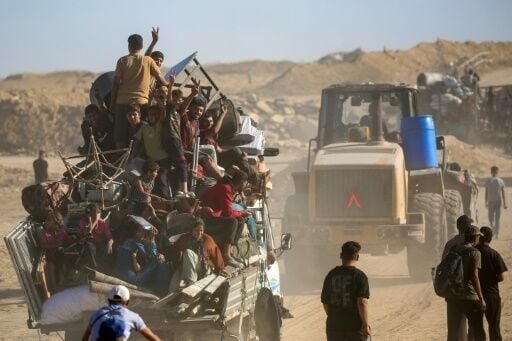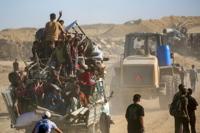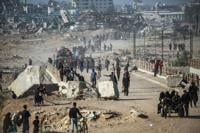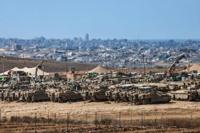Thousands of displaced Palestinians returned to a devastated Gaza City on Saturday, the second day of a ceasefire between Israel and Hamas, with many stunned by the destruction.
Israel agreed to the truce on Friday and pulled troops back from several areas of the territory, prompting long columns of exhausted residents to set off north along a coastal road.
Taking advantage of the ceasefire, Raja Salmi walked back to her home in Gaza City, where weeks of Israeli bombardment and ground operations had destroyed entire neighbourhoods, said to harbour thousands of Hamas fighters.
"We walked for hours, and every step was filled with fear and anxiety for my home," Salmi told AFP.
When she reached the Al-Rimal neighbourhood, she found her house destroyed.
"It no longer exists. It's just a pile of rubble," she said. "I stood before it and cried. All those memories are now just dust."
The flow of returnees continues, with around 50,000 people arriving in Gaza City on Saturday, according to the civil defence agency, a rescue service operating under Hamas authority.
"This brings the total number of returnees to Gaza since yesterday to around 250,000 so far," said Mohammed Al-Mughayyir, an official with the agency.
Under a ceasefire deal proposed by US President Donald Trump, Hamas will hand over 47 remaining hostages -- living and dead -- from the 251 abducted during its October 7 attack on Israel two years ago. The remains of one more hostage, held in Gaza since 2014, are also expected to be returned.
In exchange, Israel will release 250 prisoners, including those serving life sentences for deadly anti-Israeli attacks, and 1,700 Gazans detained since the war broke out.
It has released the list of 250 prisoners, which does not include any of the top militant leaders Hamas is seeking to have freed.
- 'Destruction, destruction' -
The withdrawal of Israeli forces from some areas, announced at 0900 GMT on Friday, set the clock running on a 72-hour deadline for Hamas to release the hostages, ending on Monday morning.
Hamas and its allies Islamic Jihad and the Popular Front for the Liberation of Palestine (PFLP), hailed the ceasefire as "a setback" for Israel's alleged goal of bringing about the "displacement and uprooting" of Gaza's Palestinians.
Trump told reporters on Friday he believed the ceasefire would hold, arguing that both sides were "tired of the fighting", and confirming his plans to travel to Israel and mediator Egypt this weekend.
However, many parts of the Trump proposal still have not been agreed, including its plans for post-war governance, and its insistence that Hamas disarm -- both of which Hamas has signalled resistance to.
"We are not going to be disarmed... (until) we have an independent self-sovereign state which is able to defend itself," Hamas political bureau member Bassem Naim told Sky News in an interview in English.
Trump's plan also calls for the creation of an international force to provide security in Gaza.
After visiting the territory on Saturday, the head of the US Central Command (Centcom), Admiral Brad Cooper, said no US troops will be deployed to Gaza but officials had discussed a Centcom-led "civil-military coordination center" to support post-conflict stabilization.
At Al-Rantisi hospital in Gaza City, a facility for children and cancer patients, AFP footage showed wards reduced to heaps of overturned metal beds, gaping ceilings and scattered medical equipment.
"I don't know what to say. The images speak louder than any words: destruction, destruction, and more destruction," said Saher Abu Al-Atta, a resident who had returned to the city.
With the United Nations having declared famine in Gaza City just before the outset of the latest Israeli offensive, aid agencies are hoping the ceasefire will give them the opportunity to surge in aid.
The UN's Office for Coordination of Humanitarian Affairs (OCHA) says it has been given the green light by Israel to deliver 170,000 tonnes of aid under a response plan for the first 60 days of truce.
"The most basic necessities are still urgently needed in Gaza: medical equipment, medicines, food, water, fuel, and adequate shelter for two million people who will face the approaching winter without a roof over their heads," said Jacob Granger, Gaza coordinator for Doctors Without Borders (MSF).
- 'Ghost town' -
Men, women and children navigated streets filled with rubble, searching for homes amid collapsed concrete slabs, destroyed vehicles and debris.
While some returned in vehicles most walked, carrying belongings in bags strapped to their shoulders.
Sami Musa, 28, returned alone to check on his family's house.
"Thank God... I found that our home is still standing, though it has suffered some damage that we can repair," Musa told AFP.
Nonetheless, the destruction in Gaza City left him shocked but determined to rebuild.
"It felt like a ghost town, not Gaza," Musa said. "The smell of death still lingers in the air."
Israel's campaign in Gaza has killed at least 67,682 people, according to the health ministry in the Hamas-run territory, figures the United Nations considers credible.
The data does not distinguish between civilians and combatants but indicates that more than half of the dead are women and children.
The war was sparked by Hamas's October 7, 2023 attack on Israel, which resulted in the deaths of 1,219 people, mostly civilians, according to an AFP tally based on official Israeli figures.
str-vid-al-jd/dc/csp










